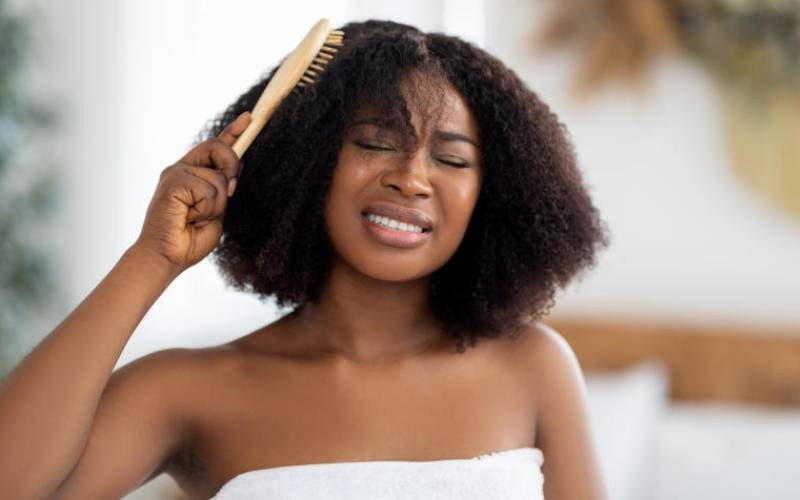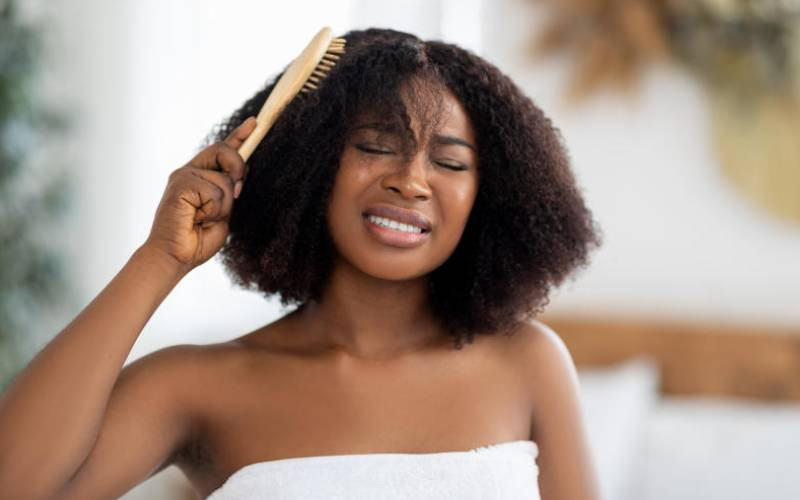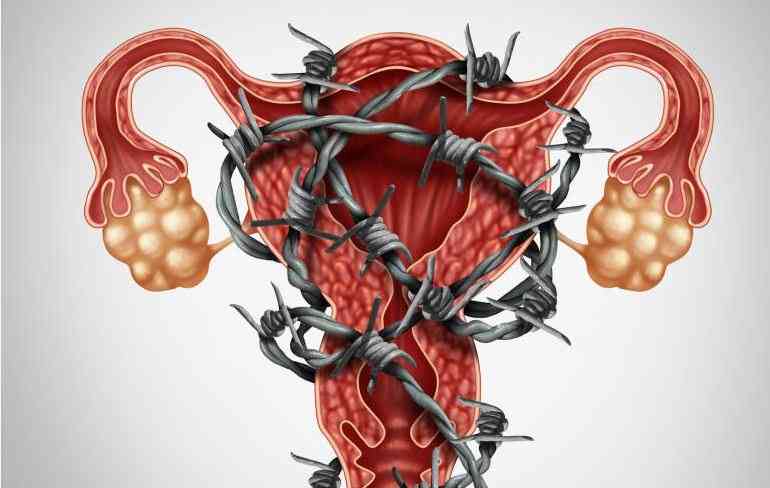
“Hair is a great marker for health and very often shows the first signs of a medical disorder,” says Sara G Allison, a trichologist in Harley Street.
So if you notice any of these problems with your locks, it could be time to see your GP...
Dry brittle hair
Over-use of straighteners and other heated tools will obviously affect the quality of your mane. However very weak, damaged hair and/or excessive hair-shedding can also be a sign of dehydration.
“Most people don’t drink enough water so ensure you drink at least two or three litres of fluid a day and avoid alcohol, tannins, sugar and caffeine,” advises Sara from the Hair Today, More Tomorrow clinic.
Extremely brittle hair and hair loss can also be symptoms of thyroid problem. So if these are persistent see your GP or a trichologist, who will refer you for tests. “It’s worth noting that your hair can be affected from only a mild imbalance to the thyroid,” adds Sara. “Mild imbalances can revert back to normal if you avoid stress and eat healthily.”
Hair care: Take a daily supplement rich in vitamin D, minerals, Omega 3 and copper.
Dandruff/scaly scalp
“Dandruff or flaky scalp is very common and affects around half the population,” says Dr Adam Friedmann, a consultant dermatologist at The Harley Street Dermatology Clinic.
“However, severe dandruff can indicate a weakened immune system.”
Make sure you are getting enough rest and avoid tension where possible. Other conditions such as seborrhoeic dermatitis, psoriasis and eczema can also cause the problem but these will affect other parts of the body too.
Hair care: Dr Friedmann says: “Wash your hair with a medicated dandruff shampoo containing salicylic acid, which dissolves away the skin cells, coal tar, which has a natural anti-fungal agent, or a tea-tree oil.
“A steroid scalp application can also be used to reduce the inflammation and itching but avoid continual use.”
See a dermatologist or your GP if the condition is severe.
Thinning hair
“This occurs in around 30% of women going through the menopause,” says Dr Asim Shahmalak of the Crown Clinic in Manchester.
“The changes in a woman’s body lead to hormonal imbalances, which result in hair loss.”
The good news is that for 50% of women this problem can be rectified by taking hormone replacement therapy (HRT). But the doctor adds: “Unfortunately, hair lost during the menopause does not grow back in women for whom HRT was not effective. The only permanent treatment is a hair transplant.”
Hair care: If you notice thinning hair alongside other menopausal symptoms, speak to a GP about HRT.
Premature greying
Defined as greying in your 20s, this is mostly down to genetics. But stress, nutritional and hormonal factors can also influence hair colour.
“Stress uses up the body’s vitamin B, which will have an affect on your hair,” says Sara G Allison. In rare cases certain diseases such as diabetes and thyroid problems can also cause premature greying.
“Generally speaking, going grey is only premature if you notice it at an earlier age than others in your family,” adds Sara.
“See your GP if you experience excessive thirst or extreme fatigue. Otherwise see a qualified trichologist.”
Hair care: Take a vitamin B supplement if you are under stress. Avoid smoking and alcohol.
Shorter layers on top
Have you noticed that you have shorter layers on top caused by breakages in new hairs growing through? If so, it’s likely you don’t have enough protein in your diet.
“This weakens the hair and leaves it less resistant to heat and chemicals,” explains Sara.
Your hair will need some serious TLC to recover. So eat well and avoid overprocessing it, ensuring you use heat protection products before styling. Sugary foods can affect absorption of protein so steer away from sweets too.
Hair care: Eat a palm-sized portion of protein at each meal.
Bald spots along the hairline
If you’re a fan of the “Croydon facelift” you may be suffering from traction alopecia, where the follicles have been permanently damaged by pulling hair too tightly. This is a fairly common problem, particularly among women of Afro-Caribbean origin,” says Dr Shahmalak.
“Causes include wearing your hair in a tight ponytail, braids or cornrows, dreadlocks, hair weaves or wigs attached with glue – even wearing a turban incorrectly. And it doesn’t only affect women. Calum Best, a hair transplant patient of mine, damaged his hair permanently by wearing it tightly pulled back in his early 20s.”
Hair care: If you spot the signs early enough and stop whatever is causing it the hair should repair itself.
Receding hair
This doesn’t just happen to older men and, says Dr Shahmalak, can be caused by a lack of diet nutrients.
“Hair can recede as a result of crash diets,” he says. “If you cut corners it will be reflected in your hair. It will look lacklustre, fall out and reflect your overall ill health.”
However, receding hair is also common among women with Polycystic Ovary Syndrome.
“Women with PCOS can develop facial hair and new hair on their arms, chest and buttocks, yet recede on the scalp,” says Dr Shahmalak.
Hair care: If you experience any other PCOS symptoms such as irregular periods or weight gain, ask your GP to investigate. Sticking to a well-balanced diet should solve the problem otherwise.
 The Standard Group Plc is a multi-media organization with investments in media platforms spanning newspaper print
operations, television, radio broadcasting, digital and online services. The Standard Group is recognized as a
leading multi-media house in Kenya with a key influence in matters of national and international interest.
The Standard Group Plc is a multi-media organization with investments in media platforms spanning newspaper print
operations, television, radio broadcasting, digital and online services. The Standard Group is recognized as a
leading multi-media house in Kenya with a key influence in matters of national and international interest.



